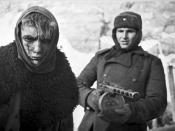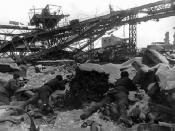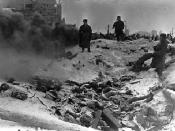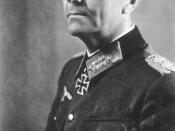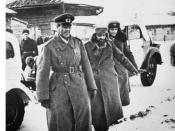Stalingrad was one of the most horrendous battles of World War II. It was fought from August 1942 to February 1943, and approximately 1.5 million troops and civilians lost their lives in the battle. The Battle of Stalingrad was fought in and around the city of Stalingrad, Russia. It was a turning point in the war not only because it destroyed a major part of the German Army, but it also caused Germany to lose the initiative in battle, which it never regained. Nazi commanders, including Hitler, made numerous mistakes that allowed the Russians to take control of the battle. Although the Russian Red Army was very determined and heroic in their efforts, the battle was not theirs to win. German superiority in manpower, training, tanks, in the air, and guns should have added up to an easy German victory. As the Red Army was pouring men into Stalingrad, superior German troops and tactics resulted in ten Russians dying for every one German in Stalingrad.
Although the Russians fought with bravery and tenacity, the Germans would have won if their commanders had not made so many errors. The German loss at Stalingrad was more due to German mistakes than Russian superiority.
Even so, it was true that the Russian Red Army did much to defeat the Germans by themselves. Russian determination not only demoralized Nazi troops, but the heroic Red Army kept the Germans from taking over Stalingrad completely. It was part of the Russian plan to hold out in Stalingrad until a counterattack could be realized. The Russian army also drew the Germans into the city of Stalingrad because blitzkrieg tactics and panzers would not be as effective among the crowded streets and high buildings. General Chuikov, in charge of the Russian defense, told his troops to stay close to the enemy lines so that the enemy could not use their superior airpower to bomb troops, for fear of hitting their own men (Lippman 3). The Russian plan, although somewhat elementary, worked. General Chuikov was to occupy the Germans in Stalingrad while General Zhukov attacked the German flanks in a massive counterattack. This counterattack, codenamed Operation Uranus, involved a million men, 25,000 heavy guns or artillery, 1,500 tanks, and three Air Armies massed on the German flanks (Yoder 1). This immensely large buildup of troops enabled the Russian counterattack to be so effective. Also, the Russian infantrymen were incredibly brave in their sacrifices for mother Russia. Some infantrymen were so heroic that they would strap live grenades to their chests, and then crawl under German tanks to blow them up (Ambrose 246). The Russian populace, as well as the army, was very determined to defend their homeland. Hitler had decreed that upon a German victory at Stalingrad, all males in Stalingrad would be exterminated and all females sent to concentration camps. This gave the citizens the motivation to fight to the bitter end, or die when the Germans won.
Although the Russians did much to defeat their enemy, the Germans committed some grave tactical errors, which enabled the Russians to win the battle. Errors were made not only by Hitler himself, but also by leaders lower in the command chain. General Friedrich Paulus, commander of the 6th Army in Stalingrad, had inexperienced and inferior Romanian, Italian, and Hungarian troops guarding the army's flanks. This allowed the Russian General Zhukov to stage a counterattack that took advantage of the weak flanks, eventually causing the downfall of the German army at Stalingrad. The German High Command actually knew about a possible counterattack on its weak flanks, but did nothing about it (Seaton 310). It is supposed that the Germans considered the foreign armies on their flanks competent, or they did not know the power of the counterattack being mustered. The Rumanian troops on the northern flank told their German commanders what would happen, but no one listened to them (Erickson 453). Perhaps the German commanders assumed that any counterattack would be easily stopped. Paulus made another tactical error by to having the 6th Army dig in at Stalingrad. The Wehrmacht, or the German Army, was primarily a mobile fighting force, not a street fighting unit. German Panzer tanks were also vastly ineffective in Stalingrad. Russian troops would hide on the top floors of buildings and toss grenades down at the tanks. Because the tanks could not raise their barrels high enough to fire back, they were mostly defenseless. Small groups of men with machine guns and grenades were much better suited to street fighting. Unfortunately, Paulus did not realize this until midway through the battle when Russians had already adapted to the requirements of street fighting. In yet another error, the German Air Force, also known as the Luftwaffe, was not ordered to bomb Russian supply ferries crossing the Volga River until late in the battle (Lippman 1). This allowed the Russians to keep resupplying their army in Stalingrad with ammunition, fresh recruits, and food. All of these errors not only hurt the German army, but actually helped the Russians to win.
Also, Hitler made some of the same mistakes as Napoleon in invading Russia. Napoleon had invaded Russia in the early 1800s with disastrous consequences. One would think that Hitler would learn the lessons of history, but Hitler's campaign in Russia mirrored Napoleon's, with the same results. Hitler expected a quick victory, just as Napoleon had. He underestimated the Russian Army and its capacity to take enormous losses. Napoleon underestimated Russian strength as well. It is known that Hitler regretted underestimating the Russians' outdated tanks. Hitler said, "Had I known Russian tank strength, ⦠I would not have started this war." (qtd. in Alarcon 4). This was after Russian tank drivers drove their burning tanks into German ones, hoping to destroy the more expensive Panzers. Hitler, just as Napoleon, assumed that the Nazis would win a series of quick victories and Russia would collapse. Unfortunately for the Germans, the Russians were able to hold out until the harsh Russian winter gave them an advantage; they were used to the cold while the Germans were not. German Command provided few soldiers with winter equipment. This would prove fatal for many troops as the winter set in. In invading Stalingrad, Hitler claimed victory too early, just as Napoleon had done when he reached Moscow in 1812. Hitler claimed victory soon after the Luftwaffe's initial bombardment of the city on August 23, 1942. Although this killed about 40,000 civilians, no one in Stalingrad was willing to give up yet (Alarcon 6). Hitler should have learned from Napoleon's mistakes, but he instead ended up making many of the same mistakes himself.
In addition, Hitler's mismanagement of the military forced some German troops to fight to their death in disadvantageous situations. Hitler was famous for his fits of rage, many of which affected his ability to rule effectively. When General Paulus' 6th Army was about to be encircled by the Russian counterattack, Paulus asked for permission to break out of the trap. Hitler insisted that Paulus should never retreat, but rather commit suicide to avoid surrender (Ambrose 247). This resulted in Paulus' 300,000-man force being reduced to 91,000 before their surrender. Of those 91,000, only 7,000 actually survived the Siberian prison camps and made it back to Germany (Kruger 5). Hitler promised Paulus a promotion if he could win decisively at Stalingrad. This prompted Paulus to launch an ill-advised attack on the front and center of the Soviet line. Paulus could not control his troops' foolhardy confidence. The night before, newly arrived German troops could be heard shouting "Russ! Tomorrow, bang-bang!" in an attempt to intimidate the Russians (qtd. in Lippman 5). Of course, this did nothing but give the battle-hardened Russians a tip about an upcoming assault. Paulus had hoped to break the Russians in two, but this attack only resulted in massive German casualties. Hitler also forced his troops to deal with starvation when they were encircled. Herman Goering, the head of the Luftwaffe, promised Hitler that Paulus' army could be easily supplied by air. This was a totally unfounded statement on the part of Goering, but Hitler believed him (MacDonald 2). Hitler's plan was for the Luftwaffe, also known as the German air force, to supply the 6th Army with food and medical supplies. In order for this plan to work, 500 tons of supplies a day were needed. The average amount supplied to the 6th Army was about 70 tons. Obviously, the German troops starved. Just before surrendering, Paulus had to order that the 12,000 wounded soldiers would no longer be given food. Only those with the strength to fight would be fed (Alarcon 9). This lack of leadership contributed greatly to the fall of the Germans at Stalingrad.
Equally important is the fact that Operation Barbarossa was well planned, but poorly implemented by the German leaders. Operation Barbarossa was the master plan for Germany's invasion of Eastern Europe and Russia. It was planned by German tacticians and military commanders, and involved a swift attack straight to Moscow and Leningrad. The original plan for invading Russia did not involve Stalingrad, but Hitler decided to invade Stalingrad and the Causcaus Mountains at the same time instead of Moscow (Lucas 5). Hitler wanted the city of Stalingrad for propaganda reasons (Stalingrad means "City of Stalin") and he needed the Causcaus Mountains for their oil fields. German mechanized warfare used a lot of oil, more than was originally planned. The Causcaus oil fields held plenty of oil for the German army, but they were heavily guarded by Russian troops. This not only stretched German troops too far, but also gave the Russians time to rebuild their army. Additionally, Hitler could have taken Stalingrad much earlier with little resistance. He had a Belgian tank division near Stalingrad in late July, when Stalingrad was an afterthought on the world stage. As fate would have it, he sent the tanks to the Causcaus Mountains instead (Fitzgibbon 3). This gave the Russians time to fortify Stalingrad and send more troops to the city, eventually leading up to one of the most horrific battles of all time. The attack on Stalingrad actually started in August of 1942. Even though the initial plan for the invasion of Russia was well thought out, Hitler and other leaders deviated from the plan so much as to make it useless.
To summarize the issue, the German army had an opportunity to win the battle at Stalingrad, but they squandered it. Tactical mistakes, stubborn refusal to retreat, and the inability to adapt tactics to street fighting made it nearly impossible for the Germans to win. The Russians fought hard and well, but it was the Nazis who lost the battle, not the Soviets who won it. Poor German leadership and Russian determination combined to cost the Nazis the battle, and ultimately, the war. Stalingrad was the turning point of World War II. The German Wehrmacht lost too many men in Stalingrad to continue their campaign against the Allies, and with Stalingrad, the momentum of the war shifted into the Allies' favor. The Germans would never regain the initiative. Stalingrad was a battle that was marked by German mistakes. These mistakes would ultimately cost them the Battle of Stalingrad.
